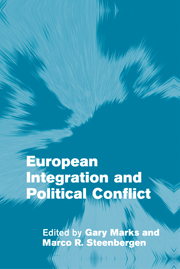Book contents
- Frontmatter
- Contents
- List of figures
- List of tables
- List of contributors
- Preface
- Introduction: Models of political conflict in the European Union
- Part I Citizens
- Part II Political parties
- 5 Defining the EU political space: an empirical study of the European election manifestos, 1979–1999
- 6 Does left/right structure party positions on European integration?
- 7 Political competition in the European Parliament: evidence from roll call and survey analyses
- 8 Contesting Europe? The salience of European integration as a party issue
- Part III Groups
- References
- Index
7 - Political competition in the European Parliament: evidence from roll call and survey analyses
Published online by Cambridge University Press: 22 September 2009
- Frontmatter
- Contents
- List of figures
- List of tables
- List of contributors
- Preface
- Introduction: Models of political conflict in the European Union
- Part I Citizens
- Part II Political parties
- 5 Defining the EU political space: an empirical study of the European election manifestos, 1979–1999
- 6 Does left/right structure party positions on European integration?
- 7 Political competition in the European Parliament: evidence from roll call and survey analyses
- 8 Contesting Europe? The salience of European integration as a party issue
- Part III Groups
- References
- Index
Summary
Ever since Schumpeter (1942) defined democracy in terms of a competition of political leaders for the votes of the people, public contestation or political competition has been generally recognized as one of the most essential characteristics of modern democracy (Dahl 1971). As modern democracy is hardly conceivable without political parties, political competition implies a major function for mass political parties. As Bingham Powell (1982: 3) puts it: “The competitive electoral context, with several political parties organizing the alternatives that face the voters, is the identifying property of the contemporary democratic process.” It is in this respect that the European Union is often said to be failing. There is no competitive electoral context at the European level. European elections are basically fought by national political parties on national rather than European issues. Because national party systems are based on national cleavages, they fail to organize the alternatives that are relevant to the voters in European elections, i.e., alternatives with respect to the development of the European Union as such. Even worse, any debate on these issues is suppressed by the leadership of the major political parties because they are internally divided on these issues and would risk being split apart when these issues were politicized. In order to remedy this aspect of the democratic deficit, it has been argued that in order to face the European electorate with a relevant choice, the party system should be reshuffled in such a way that parties organize themselves along the continuum pro-vs. Anti-European Integration.
- Type
- Chapter
- Information
- European Integration and Political Conflict , pp. 141 - 164Publisher: Cambridge University PressPrint publication year: 2004
- 18
- Cited by



